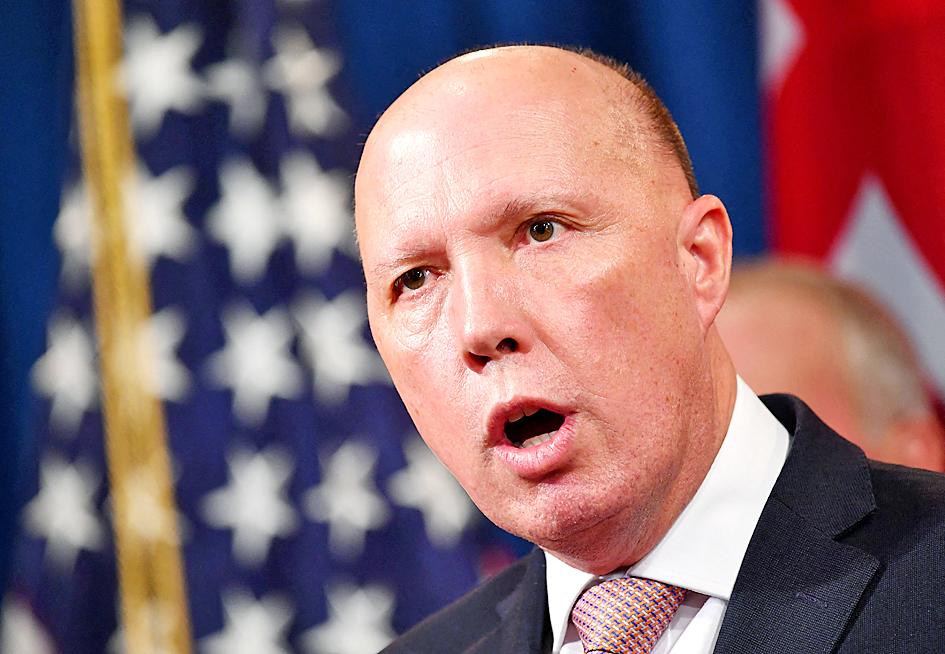Australia would act according to the US response in the event of a Chinese attack on Taiwan, Australian Minister for Defence Peter Dutton said in an interview with Sky News yesterday.
“China’s been very clear about their intent with regard to Taiwan. Equally, the United States has been clear about their intention toward Taiwan,” Dutton said.
“Nobody wants to see conflict, but that really is a question for the Chinese,” he said.

Photo: AFP
When asked by reporter Annelise Nielsen whether Australia was ever likely to find itself in an armed conflict with China, Dutton talked about Australia’s 70-year history of military cooperation with the US.
If Taiwan were attacked, Australia would see “what the American response was,” Dutton said, adding that “we obviously have an alliance with the United States.”
Dutton said he had been focused on China during the past six years since he joined the Australian National Security Committee.
China’s actions have been a concern and Australia wants its neighbors to be free of coercion, interference or bullying, he said.
Given Australia’s comparatively small population of about 25 million, it is important for it to have good friends, which it has with nations such as the US, the UK, Canada and New Zealand, Dutton said.
The Quadrilateral Security Dialogue between the US, India, Japan and Australia, and ASEAN are also important for stability, he said.

The CIA has a message for Chinese government officials worried about their place in Chinese President Xi Jinping’s (習近平) government: Come work with us. The agency released two Mandarin-language videos on social media on Thursday inviting disgruntled officials to contact the CIA. The recruitment videos posted on YouTube and X racked up more than 5 million views combined in their first day. The outreach comes as CIA Director John Ratcliffe has vowed to boost the agency’s use of intelligence from human sources and its focus on China, which has recently targeted US officials with its own espionage operations. The videos are “aimed at

STEADFAST FRIEND: The bills encourage increased Taiwan-US engagement and address China’s distortion of UN Resolution 2758 to isolate Taiwan internationally The Presidential Office yesterday thanked the US House of Representatives for unanimously passing two Taiwan-related bills highlighting its solid support for Taiwan’s democracy and global participation, and for deepening bilateral relations. One of the bills, the Taiwan Assurance Implementation Act, requires the US Department of State to periodically review its guidelines for engagement with Taiwan, and report to the US Congress on the guidelines and plans to lift self-imposed limitations on US-Taiwan engagement. The other bill is the Taiwan International Solidarity Act, which clarifies that UN Resolution 2758 does not address the issue of the representation of Taiwan or its people in

US Indo-Pacific Commander Admiral Samuel Paparo on Friday expressed concern over the rate at which China is diversifying its military exercises, the Financial Times (FT) reported on Saturday. “The rates of change on the depth and breadth of their exercises is the one non-linear effect that I’ve seen in the last year that wakes me up at night or keeps me up at night,” Paparo was quoted by FT as saying while attending the annual Sedona Forum at the McCain Institute in Arizona. Paparo also expressed concern over the speed with which China was expanding its military. While the US

SHIFT: Taiwan’s better-than-expected first-quarter GDP and signs of weakness in the US have driven global capital back to emerging markets, the central bank head said The central bank yesterday blamed market speculation for the steep rise in the local currency, and urged exporters and financial institutions to stay calm and stop panic sell-offs to avoid hurting their own profitability. The nation’s top monetary policymaker said that it would step in, if necessary, to maintain order and stability in the foreign exchange market. The remarks came as the NT dollar yesterday closed up NT$0.919 to NT$30.145 against the US dollar in Taipei trading, after rising as high as NT$29.59 in intraday trading. The local currency has surged 5.85 percent against the greenback over the past two sessions, central